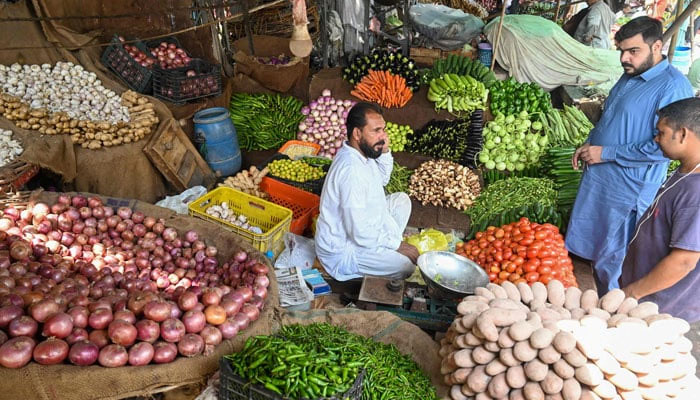Weekly inflation rises after a brief pause, fuelled by soaring food prices
Weekly inflation went up 0.11% week-on-week and 37.07% year-on-year during the seven-day period ended October 5
KARACHI: Weekly inflation went up 0.11 percent week-on-week and 37.07 percent year-on-year during the seven-day period ended October 5, official data showed on Friday, rising after a week’s lull in response to higher petroleum and food prices.
The Pakistan Bureau of Statistics (PBS) attributed the increase in SPI to the rise in prices of tomatoes (12.45 percent), onions (11.96 percent), LPG (3.11 percent), garlic (2.59 percent), potatoes (1.81 percent), cooked daal (1.27 percent), eggs (0.84 percent), firewood (0.76 percent), beef (0.53 percent), bread (0.52 percent), and long cloth (0.51 percent).
On the other hand, major decrease was observed in the prices of diesel (3.33 percent), chicken (2.78 percent), petrol (2.40 percent), pulse masoor (1.80 percent), pulse gram (1.73 percent), gur (1.14 percent), pulse moong (0.58 percent), pulse mash (0.33 percent), wheat flour (0.32 percent) and vegetable ghee (0.20 percent).
For the week under review, SPI was recorded at 282.00 points against 281.70 points registered last week and 205.73 points recorded during the week ended October 6, 2022. PBS compiles SPI via collecting prices of 51 essential items from 50 markets in 17 cities of the country.
During the week, out of 51 items, prices of 19 (37.26 percent) items increased, 16 (31.37 percent) items decreased and 16 (45.10 percent) items remained stable. Although WoW SPI has remained below one percent in the last nine consecutive weeks, for the groups spending up to Rs17,732; Rs17,733-22,888; Rs22,889-29,517; Rs29,518-44,175; and above Rs44,175; YoY SPI now stands at 35.21, 38.08, 37.56, 36.68, and 33.35 percent, respectively.
PBS data showed that the highest increase in SPI was faced by those spending Rs17,733-22,888, while the lowest impact was witnessed by those spending more than Rs44,175. According to analysts, the numbers were in line with expectations; however, for ordinary Pakistani’s life has become unsustainable.
A vegetable vendor said his independence was compromised because of the uncontrolled price hike. “Government slashed the price of petrol and diesel, but the transportation mafia has not brought prices down,” he said, lamenting that transporting vegetables from the main sabzi mandi on the Super Highway was proving very expensive. “People are compromising on food intake, I can tell by the drop in my sales,” he added.
Different weightages are assigned to various commodities in the SPI basket. Commodities with the highest weights for the lowest quintile include milk (17.5449 percent), electricity (8.3627 percent), wheat flour (6.1372 percent), sugar (5.1148 percent), firewood (5.0183 percent), long cloth (4.2221 percent), and vegetable ghee (3.2833 percent).
Of these commodities, prices of milk, sugar, firewood, and long cloth increased; wheat flour, and vegetable ghee prices declined; while only the price of electricity remained the same.
The YoY trend depicts increase of 37.07 percent, electricity charges for Q1 (118.16 percent), gas charges for Q1 (108.38 percent), cigarettes (94.69 percent), broken basmati rice (87.60 percent), chilli powder (84.84 percent), sugar (79.55 percent), rice irri-6/9 (78.69 percent), wheat flour (77.91 percent), gur (67.68 percent), tea (60.72 percent), gents sponge chappal (58.05 percent), salt (56.48 percent), garlic (54.78 percent), gents sandal (53.37 percent), petrol (43.70 percent), and potatoes (42.99 percent).
The PBS noted a YoY decline in the prices of tomatoes (54.05 percent), onions (18.21 percent), pulse gram (2.67 percent), and mustard oil (0.16 percent).
-
 Eric Dane's Girlfriend Janell Shirtcliff Pays Him Emotional Tribute After ALS Death
Eric Dane's Girlfriend Janell Shirtcliff Pays Him Emotional Tribute After ALS Death -
 King Charles Faces ‘stuff Of The Nightmares’ Over Jarring Issue
King Charles Faces ‘stuff Of The Nightmares’ Over Jarring Issue -
 Sarah Ferguson Has ‘no Remorse’ Over Jeffrey Epstein Friendship
Sarah Ferguson Has ‘no Remorse’ Over Jeffrey Epstein Friendship -
 A$AP Rocky Throws Rihanna Surprise Birthday Dinner On Turning 38
A$AP Rocky Throws Rihanna Surprise Birthday Dinner On Turning 38 -
 Andrew Jokes In Hold As BAFTA Welcomes Prince William
Andrew Jokes In Hold As BAFTA Welcomes Prince William -
 Sam Levinson Donates $27K To Eric Dane Family Fund After Actor’s Death
Sam Levinson Donates $27K To Eric Dane Family Fund After Actor’s Death -
 Savannah Guthrie Mother Case: Police Block Activist Mom Group Efforts To Search For Missing Nancy Over Permission Row
Savannah Guthrie Mother Case: Police Block Activist Mom Group Efforts To Search For Missing Nancy Over Permission Row -
 Dove Cameron Calls '56 Days' Casting 'Hollywood Fever Dream'
Dove Cameron Calls '56 Days' Casting 'Hollywood Fever Dream' -
 Prince William, Kate Middleton ‘carrying Weight’ Of Reputation In Epstein Scandal
Prince William, Kate Middleton ‘carrying Weight’ Of Reputation In Epstein Scandal -
 Timothée Chalamet Compares 'Dune: Part Three' With Iconic Films 'Interstellar', 'The Dark Knight' & 'Apocalypse Now'
Timothée Chalamet Compares 'Dune: Part Three' With Iconic Films 'Interstellar', 'The Dark Knight' & 'Apocalypse Now' -
 Little Mix Star Leigh-Anne Pinnock Talks About Protecting Her Children From Social Media
Little Mix Star Leigh-Anne Pinnock Talks About Protecting Her Children From Social Media -
 Ghislaine Maxwell Is ‘fall Guy’ For Jeffrey Epstein, Claims Brother
Ghislaine Maxwell Is ‘fall Guy’ For Jeffrey Epstein, Claims Brother -
 Timothee Chalamet Rejects Fame Linked To Kardashian Reality TV World While Dating Kylie Jenner
Timothee Chalamet Rejects Fame Linked To Kardashian Reality TV World While Dating Kylie Jenner -
 Sarah Chalke Recalls Backlash To 'Roseanne' Casting
Sarah Chalke Recalls Backlash To 'Roseanne' Casting -
 Pamela Anderson, David Hasselhoff's Return To Reimagined Version Of 'Baywatch' Confirmed By Star
Pamela Anderson, David Hasselhoff's Return To Reimagined Version Of 'Baywatch' Confirmed By Star -
 Willie Colón, Salsa Legend, Dies At 75
Willie Colón, Salsa Legend, Dies At 75




